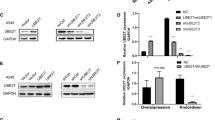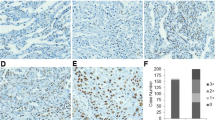Abstract
The oncogenic role of ubiquitin-conjugating enzyme E2C (UBE2C) had been identified in some types of human tumors, while the clinical and biological role of UBE2C in non-small cell lung cancer (NSCLC) is still elusive. Here, we have determined the specific role of UBE2C in NSCLC. Western blot and qRT-PCR were used for detecting the mRNA level and protein level of UBE2C in NSCLC samples and cell lines, respectively. Lentivirus product was used to conduct loss of function assay. qRT-PCR array was employed to detect potential downstream genes regulated by UBE2C. As the result, UBE2C mRNA level was approximately threefold overexpression in NSCLC tissues compared with normal tissues, while a sharp change was detected at protein level. Overexpression of UBE2C in lung cancer samples was correlated with advanced pathological stage. UBE2C regulated cell growth in an apoptosis-dependent way. PCR Array analysis revealed that UBE2C regulated the expression of genes associated with tumor growth, apoptosis, and angiogenesis. Furthermore, UBE2C could regulate phospho-ERK1/2 level but not STAT3, YAP, or AKT pathway, which was accompanied with the classic function of ERK pathway in cell growth and apoptosis. In conclusion, our results indicated UBE2C might be a novel therapeutic target in NSCLC.





Similar content being viewed by others
References
Siegel R, Ma J, Zou Z, Jemal A. Cancer statistics, 2014. CA Cancer J Clin. 2014;64:9–29.
Travis WD, Brambilla E, Noguchi M, Nicholson AG, Geisinger K, et al. International Association for the Study of Lung Cancer/American Thoracic Society/European Respiratory Society: international multidisciplinary classification of lung adenocarcinoma: executive summary. Proc Am Thorac Soc. 2011;8:381–5.
Shaid S, Brandts C, Serve H, Dikic I. Ubiquitination and selective autophagy. Cell Death Differ. 2013;20:21–30.
Pickart CM. Mechanisms underlying ubiquitination. Ann Rev Biochem. 2001;70:503–33.
Hock AK, Vousden KH. The role of ubiquitin modification in the regulation of p53. Biochim Biophys Acta (BBA). 2014;1843:137–49.
Burger AM, Seth AK. The ubiquitin-mediated protein degradation pathway in cancer: therapeutic implications. Eur J Cancer. 2004;40:2217–29.
Loussouarn D, Campion L, Leclair F, Campone M, Charbonnel C, et al. Validation of UBE2C protein as a prognostic marker in node-positive breast cancer. Br J Cancer. 2009;101:166–73.
Chen S, Chen Y, Hu C, Jing H, Cao Y, et al. Association of clinicopathological features with UbcH10 expression in colorectal cancer. J Cancer Res Clin Oncol. 2010;136:419–26.
Bavi P, Uddin S, Ahmed M, Jehan Z, Bu R, et al. Bortezomib stabilizes mitotic cyclins and prevents cell cycle progression via inhibition of UBE2C in colorectal carcinoma. Am J Pathol. 2011;178:2109–20.
Ieta K, Ojima E, Tanaka F, Nakamura Y, Haraguchi N, et al. Identification of overexpressed genes in hepatocellular carcinoma, with special reference to ubiquitin-conjugating enzyme E2C gene expression. Int J Cancer. 2007;121:33–8.
Kadara H, Lacroix L, Behrens C, Solis L, Gu X, et al. Identification of gene signatures and molecular markers for human lung cancer prognosis using an in vitro lung carcinogenesis system. Cancer Prev Res. 2009;2:702–11.
Takezawa K, Okamoto I, Nishio K, Jänne PA, Nakagawa K. Role of ERK-BIM and STAT3-survivin signaling pathways in ALK inhibitor–induced apoptosis in EML4-ALK–positive lung cancer. Clin Cancer Res. 2011;17:2140–8.
Scrima M, De Marco C, Fabiani F, Franco R, Pirozzi G, et al. Signaling networks associated with AKT activation in non-small cell lung cancer (NSCLC): new insights on the role of phosphatydil-inositol-3 kinase. PLoS One. 2012;7:e30427.
Yang C-L, Liu Y-Y, Ma Y-G, Xue Y-X, Liu D-G, et al. Curcumin blocks small cell lung cancer cells migration, invasion, angiogenesis, cell cycle and neoplasia through Janus kinase-STAT3 signalling pathway. PLoS One. 2012;7:e37960.
Lin C-W, Chang Y-L, Chang Y-C, Lin J-C, Chen C-C, et al. MicroRNA-135b promotes lung cancer metastasis by regulating multiple targets in the Hippo pathway and LZTS1. Nat Commun. 2013;4:1877.
Hao Z, Zhang H, Cowell J. Ubiquitin-conjugating enzyme UBE2C: molecular biology, role in tumorigenesis, and potential as a biomarker. Tumor Biol. 2012;33:723–30.
Wagner KW, Sapinoso LM, Frierson HF, Butz N, Mestan J, et al. Overexpression, genomic amplification and therapeutic potential of inhibiting the UbcH10 ubiquitin conjugase in human carcinomas of diverse anatomic origin. Oncogene. 2004;23:6621–9.
Berlingieri M, Pallante P, Guida M, Nappi C, Masciullo V, et al. UbcH10 expression may be a useful tool in the prognosis of ovarian carcinomas. Oncogene. 2007;26:2136–40.
Farhat FS, Tfayli A, Fakhruddin N, Mahfouz R, Otrock ZK, et al. Expression, prognostic and predictive impact of VEGF and bFGF in non-small cell lung cancer. Crit Rev Oncol Hematol. 2012;84:149–60.
Zhao M, Gao F-H, Wang J-Y, Liu F, Yuan H-H, et al. JAK2/STAT3 signaling pathway activation mediates tumor angiogenesis by upregulation of VEGF and bFGF in non-small-cell lung cancer. Lung Cancer. 2011;73:366–74.
Kim SJ, Rabbani ZN, Dewhirst MW, Vujaskovic Z, Vollmer RT, et al. Expression of HIF-1α, CA IX, VEGF, and MMP-9 in surgically resected non-small cell lung cancer. Lung Cancer. 2005;49:325–35.
Cox G, Jones JL, O’Byrne KJ. Matrix metalloproteinase 9 and the epidermal growth factor signal pathway in operable non-small cell lung cancer. Clin Cancer Res. 2000;6:2349–55.
Acknowledgments
This study was supported by Science and Technology Research Project of Henan province (132102310355) and the Science and Technology Research Project of Jinshui district in 2014 (201433).
Conflict of interest
None.
Author information
Authors and Affiliations
Corresponding author
Electronic supplementary material
Below is the link to the electronic supplementary material.
Rights and permissions
About this article
Cite this article
Zhang, Z., Liu, P., Wang, J. et al. Ubiquitin-conjugating enzyme E2C regulates apoptosis-dependent tumor progression of non-small cell lung cancer via ERK pathway. Med Oncol 32, 149 (2015). https://doi.org/10.1007/s12032-015-0609-8
Received:
Accepted:
Published:
DOI: https://doi.org/10.1007/s12032-015-0609-8




